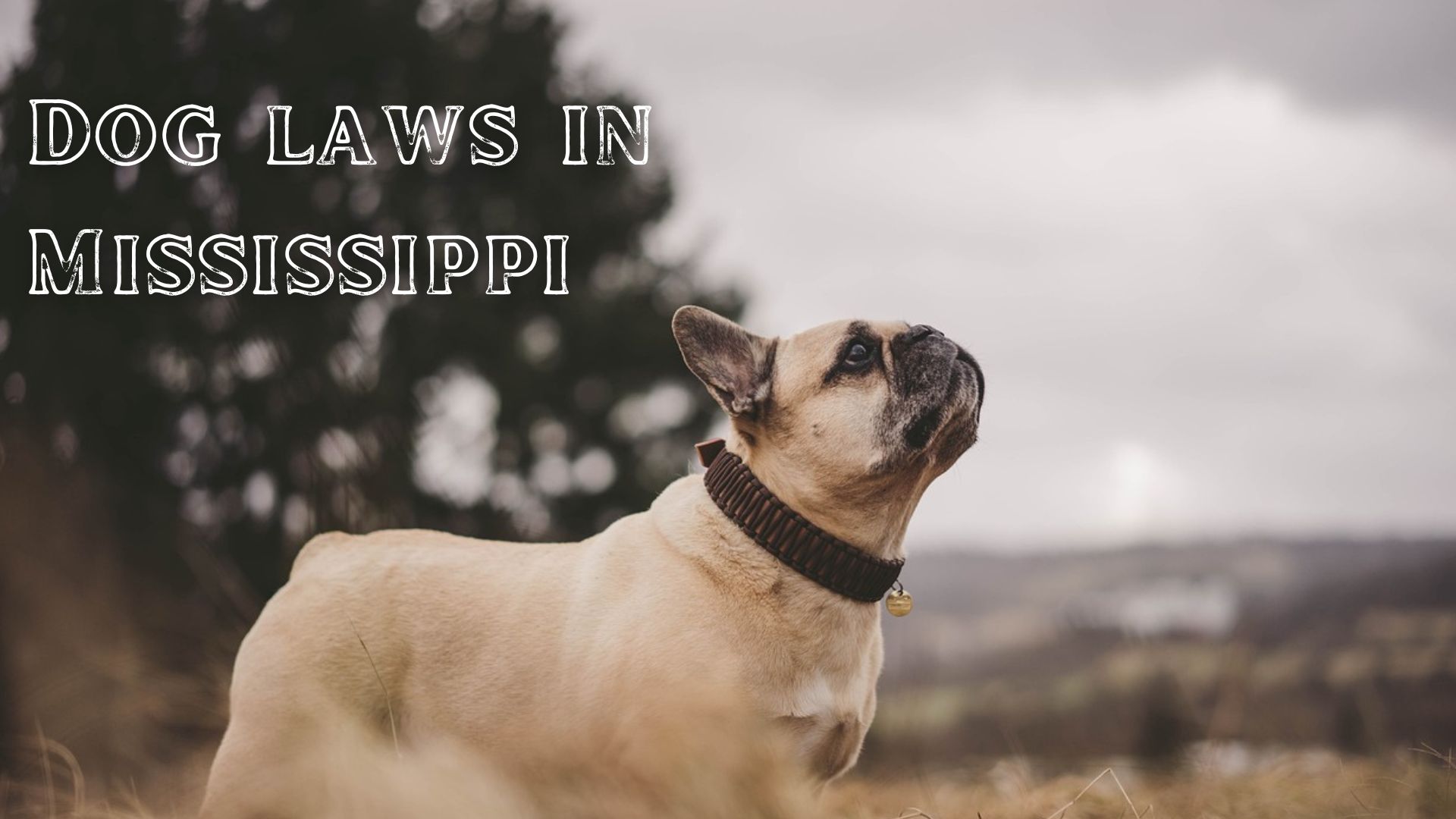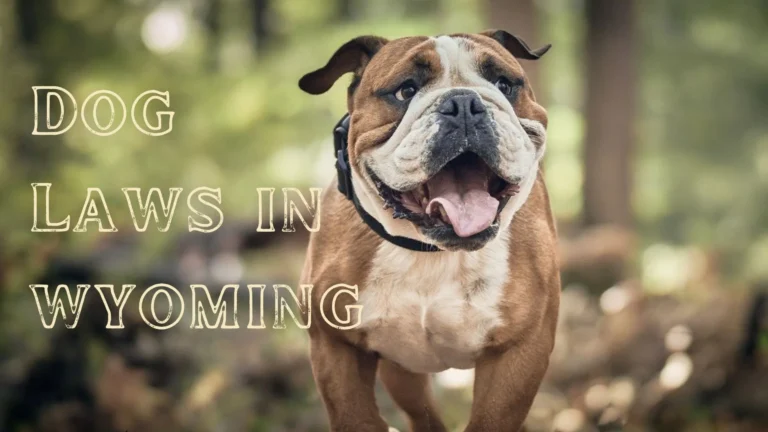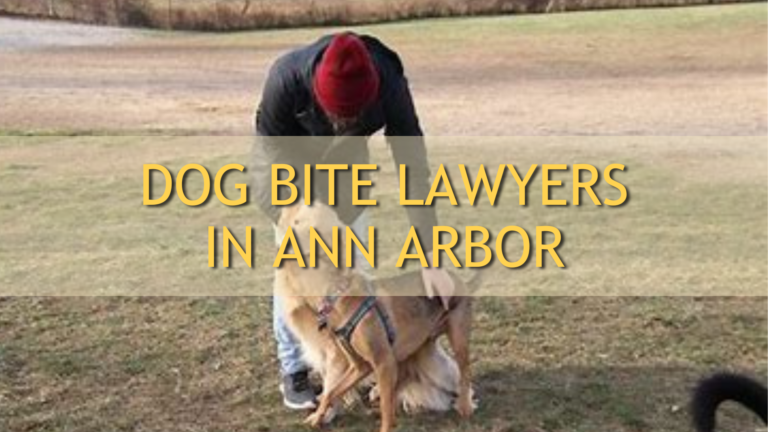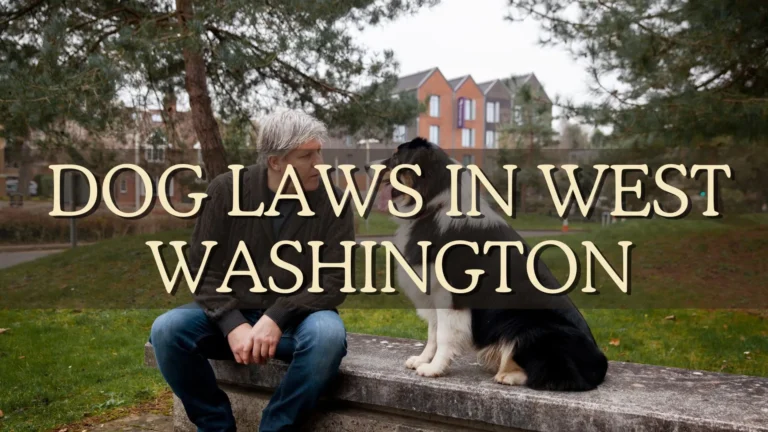Dog Laws in Mississippi
As a vet, I treat all sorts of furry friends, and let me tell you, across the USA, over 63 million households consider a dog part of the family. But with all that love comes responsibility, and that includes understanding the legalities of canine life.
Here in Mississippi, dog laws can seem like a tangled leash, but don’t worry! We’ll explore the different areas these laws cover, from vaccinations and licensing to leash laws and dangerous dog designations. By understanding these regulations, you and your pup can have a tail-wagging good time, all within the bounds of Mississippi law!
Table of Contents
Dog Bite Laws in Mississippi
Every dog owner wants their furry friend to be a source of joy, but dog bites are a reality that can cause serious injury and emotional distress. Understanding Mississippi’s dog bite laws is crucial for both dog owners and potential victims. Here, we’ll untangle the legal leash and explore the key aspects of dog bite liability in the Magnolia State.

Mississippi’s “One Bite Rule”
Unlike some states with stricter “strict liability” laws, Mississippi follows the traditional common law principle of the “one bite rule.” This means that a dog owner is generally only liable for a bite injury if the dog has a history of prior vicious behavior.
The burden of proof falls on the victim to demonstrate that:
- The dog owner knew or should have known of the dog’s dangerous propensities.
- The victim was lawfully on the property (i.e., not trespassing) when bitten.
- The bite caused injury.
What Constitutes “Prior Vicious Behavior”?
Previous bites are the most obvious evidence of a dog’s dangerous tendencies. However, courts may also consider other aggressive behaviors, such as:
- Growling or snapping
- Chasing or lunging at people
- Past incidents of inflicting injury (even without breaking skin)
Exceptions to the “One Bite Rule”
Mississippi recognizes some exceptions where the “one bite rule” may not apply:
- Negligence: If a dog owner’s negligence contributes to the bite (e.g., leaving a gate unlocked, failing to leash a dog in a required area), they may be liable even without prior vicious behavior. Examples include a dog escaping due to a broken fence or a dog attacking someone on a leash due to the owner’s inability to control it.
- Leash Laws: Violating leash laws in public spaces could be considered negligence and contribute to liability.
- Dangerous Dog Designations: Mississippi has a process for local authorities to declare a dog “dangerous” after multiple bite incidents or severe aggression. Owners of designated dangerous dogs face stricter liability and potential quarantine or euthanasia of the animal.
What to Do After a Dog Bite
If you’re bitten by a dog in Mississippi, take these steps:
- Seek Medical Attention: This is crucial for documenting the injury and receiving proper treatment.
- Report the Bite: File a report with animal control, detailing the incident and the dog’s owner information (if known).
- Gather Evidence: If possible, take pictures of the bite wound, the dog, and the scene of the incident. Get witness statements if available.
- Consult an Attorney: An experienced personal injury lawyer can advise you on your legal options and potential for compensation.
Additional Considerations
- Homeowner’s Insurance: Many homeowner’s insurance policies cover dog bite liability for the policyholder.
- Children and Dog Bites: Mississippi law recognizes a special standard of care for interactions between children and dogs. Dog owners may be held liable for bites to children even without a history of prior vicious behavior.
Beyond Mississippi Dog Bite Laws
While Mississippi’s dog bite laws provide a framework, it’s important to remember:
- Local Ordinances: Cities and counties within Mississippi may have additional dog bite or animal control ordinances.
- Preventative Measures: The best way to avoid dog bites is through responsible ownership. Proper training, socialization, and secure containment are key.
Dog Barking and Noise Laws in Mississippi
Living in Mississippi often means enjoying the peace and tranquility of Southern charm. But that serenity can be shattered by the persistent barking of a neighbor’s dog. Here, we’ll explore the legalities surrounding dog barking and noise ordinances in the Magnolia State.

Statewide Dog Barking Law
Unlike some states with specific decibel limits or time restrictions, Mississippi lacks a statewide law regulating dog barking. However, there are still legal avenues to address excessive barking through:
- Local Noise Ordinances: Most cities and counties in Mississippi have their own noise ordinances that may include regulations on animal noise, including dog barking. These ordinances typically define what constitutes excessive noise and may outline allowable times for such noise.
- Nuisance Laws: Mississippi, like most states, recognizes the concept of nuisance. This means that if a dog’s barking is unreasonably frequent, prolonged, or loud enough to disrupt the peace and enjoyment of neighboring properties, it could be considered a nuisance.
Local Noise Ordinance
The specific regulations on dog barking will vary depending on your location in Mississippi. Here’s how to find your local noise ordinance:
- Municipal Website: Most city and county websites will have information on their local ordinances, including noise control.
- Animal Control Department: Contact your local animal control department. They can provide details on the relevant ordinance and the complaint process.
What Defines Excessive Dog Barking
While specifics vary by locality, some common factors considered in defining excessive barking include:
- Duration: Barking that continues for extended periods, like several hours straight, is more likely to be deemed excessive.
- Frequency: Occasional barking is normal, but constant or very frequent barking may violate noise ordinances.
- Time of Day: Barking late at night or early in the morning may be more disruptive and subject to stricter regulations.
- Reasonableness: Barking triggered by a perceived threat or in response to another dog barking is less likely to be considered excessive compared to barking for no apparent reason.
Resolving a Barking Dog Issue
If you’re disturbed by a neighbor’s dog barking, here are some steps you can take:
- Talk to Your Neighbor: A friendly conversation with your neighbor about the barking might be the easiest solution. They may be unaware of the problem or might be willing to take steps to address it.
- File a Noise Complaint: If a friendly approach doesn’t work, you can file a complaint with your local animal control department. They will investigate and may issue a warning to the dog owner.
- Mediation: Some municipalities offer mediation services to help neighbors resolve disputes over noise issues.
Important Considerations
- Gather Evidence: If you plan to file a complaint, keep a record of the barking incidents, including dates, times, and durations. This can be helpful documentation for animal control.
- Be Reasonable: Occasional barking is a normal part of dog behavior. Focus on addressing persistent and disruptive barking.
- Respectful Communication: Maintain a respectful tone when communicating with your neighbor or animal control.
Preventing Dog Barking
The best way to deal with excessive barking is to prevent it from happening in the first place. Here are some tips for dog owners:
- Proper Training: Train your dog basic obedience commands, including a “quiet” cue.
- Provide Enrichment: Boredom can lead to barking. Offer your dog plenty of exercise, mental stimulation, and interactive toys.
- Address Underlying Causes: Sometimes, barking stems from anxiety, fear, or separation issues. Consult a professional dog trainer or veterinarian if you suspect these underlying causes.
- Secure Your Property: Ensure your dog’s yard is properly fenced to prevent barking triggered by seeing passersby or other animals.
Mississippi and “Right to Farm” Laws
It’s important to note that Mississippi has strong “right to farm” laws. This means that residents living in rural areas may have limited recourse for noise complaints related to agricultural activities, including barking dogs associated with working farms.
Dog Poop Disposal Laws in Mississippi
Those morning walks with your furry friend are a joy, but responsible pet ownership goes beyond playtime. In Mississippi, like most places, cleaning up after your dog is not just a courtesy, it’s the law. This article explores the legalities of dog waste disposal in the Magnolia State.

Statewide Dog Poop Law
While there’s no single state law mandating dog waste disposal in Mississippi, most cities and counties have ordinances requiring pet owners to pick up after their dogs. These ordinances may vary in specifics, but the general principle remains the same: scoop that poop!
Why Poop Matters
Dog waste isn’t just unpleasant; it can be a health and environmental hazard. Dog poop can harbor harmful bacteria and parasites that can pose a risk to humans and other animals. Additionally, rainwater runoff can carry dog waste into waterways, contaminating water sources and contributing to algae blooms.
Dog Waste Disposal Ordinance
The specific regulations on dog waste disposal will depend on your location in Mississippi. Here’s how to find the relevant ordinance for your area:
- Municipal Website: Most city and county websites will have information on their local ordinances, including pet waste disposal regulations.
- Animal Control Department: Contact your local animal control department. They can provide details on the specific ordinance and the potential consequences for non-compliance.
Dog Waste Disposal Ordinances Address
While specifics will vary, most dog waste disposal ordinances in Mississippi likely address these key points:
- Required Pick-Up: Dog owners are responsible for picking up their dog’s waste in all public spaces, including parks, sidewalks, and trails.
- Carrying Means of Disposal: Owners may be required to carry bags or other means to properly dispose of the waste.
- Proper Disposal Locations: Ordinances may specify designated waste disposal bins or require waste to be bagged and disposed of in regular trash receptacles.
- Fines for Non-Compliance: Failure to pick up after your dog can result in fines, typically ranging from minor infractions to more significant penalties for repeat offenders.
Beyond Local Ordinances
While local ordinances are the primary legal framework for dog waste disposal in Mississippi, there are additional considerations:
- Private Property: Mississippi property owners can set their own rules regarding dog waste on their land. Always ask permission before allowing your dog to use someone else’s property and be prepared to clean up after them.
- Homeowner’s Associations: Many homeowners’ associations (HOAs) have their own regulations regarding pet waste disposal within their communities.
Responsible Dog Ownership
Following dog waste disposal laws is crucial, but responsible pet ownership goes beyond legal requirements. Here are some tips for being a good dog owner and keeping your community clean:
- Always carry poop bags: Make it a habit to carry enough bags on every walk to dispose of your dog’s waste properly.
- Double-bag it: This helps prevent leaks and reduces unpleasant odors.
- Dispose of waste promptly: Don’t leave bagged waste lying around; find a designated bin or trash receptacle.
- Be a good neighbor: If you see someone not picking up after their dog, consider a friendly reminder or offer a spare bag.
Environmental Considerations for Dog Waste Disposal
While Mississippi doesn’t have specific regulations on dog waste disposal methods, some eco-friendly options are worth considering:
- Biodegradable bags: These bags break down more quickly than traditional plastic bags, minimizing landfill waste.
- Composting: If you have a yard and the proper setup, composting dog waste can be a sustainable option. However, research the proper composting methods for dog waste to avoid attracting pests or contaminating your compost pile.
Dog Licensing Laws in Mississippi
In Mississippi, where friendly faces and wagging tails are a common sight, responsible dog ownership is more than just belly rubs and walks in the park. One key aspect of responsible pet care is ensuring your canine companion is properly licensed. This informative guide will explore the ins and outs of dog licensing laws in the Magnolia State.

Mississippi State Law Dog Licensing
Unlike some states where dog licensing is optional, Mississippi has a mandatory dog licensing law. This law applies to all dogs four months of age or older residing in the state.
Benefits of Dog Licensing
Obtaining a license for your dog offers several benefits:
- Identification: A dog license serves as an official ID for your furry friend. It typically includes information like the dog’s name, breed, and owner’s contact details. This can be crucial in reuniting you with your pet if they become lost.
- Vaccination Records: Dog licensing often coincides with rabies vaccination verification. Keeping your dog’s rabies vaccination up-to-date protects not only your pet but also public health.
- Funding for Animal Services: Licensing fees contribute to funding animal control services, including shelters, rescue efforts, and spay/neuter programs.
- Reduced Fees: Licensed dogs may be subject to lower impoundment fees if they’re picked up by animal control.
Obtaining a Dog License in Mississippi
The process for obtaining a dog license in Mississippi typically involves:
- Contacting Your County Tax Collector: Your local county tax collector’s office is responsible for issuing dog licenses.
- Providing Proof of Rabies Vaccination: You’ll need to show proof of your dog’s current rabies vaccination to obtain a license.
- Paying the Licensing Fee: The cost of a dog license varies depending on the county and whether your dog is spayed or neutered. Generally, fees are lower for sterilized dogs.
- Receiving a Dog Tag: Once licensed, your dog will receive a tag with their license information. This tag should be securely attached to your dog’s collar at all times.
Renewal of Dog Licenses
Dog licenses in Mississippi are typically valid for one year. Renewals are necessary to maintain your dog’s legal status and ensure their information remains current. Most counties allow for convenient online or mail-in renewals, while some require a visit to the tax collector’s office.
Fines and Penalties for Non-Compliance
Failing to license your dog in Mississippi can result in fines and penalties. These vary by county but can range from minor infractions to more significant fees for repeat offenders. Additionally, unlicensed dogs may be impounded by animal control, and you may face additional fees to reclaim your pet.
Exceptions to Dog Licensing Requirements
There are a few exceptions to Mississippi’s mandatory dog licensing law:
- Working Dogs: Working dogs, such as those used for herding livestock or hunting, may be exempt from licensing requirements. Contact your county tax collector’s office for details on specific exemptions for working dogs in your area.
- Service Animals: Federally recognized service animals are exempt from licensing requirements.
Additional Considerations
- Microchipping: While not a substitute for dog licensing, microchipping your dog is a highly recommended form of identification. A microchip can permanently link you to your pet, increasing the chances of a safe reunion if they become lost.
- City or County Ordinances: Some cities and counties in Mississippi may have additional ordinances related to dog licensing or pet ownership. Always check with your local authorities for any specific regulations in your area.
Dog Leash Laws in Mississippi
Mississippi’s wide-open spaces and friendly charm often make it a dog lover’s paradise. But ensuring your furry friend enjoys those walks safely and responsibly requires understanding leash laws. This comprehensive guide explores the legalities of leashing dogs in the Magnolia State.

Statewide Dog Leash Law
Unlike some states with blanket leash laws, Mississippi lacks a single, unified leash law for the entire state. The authority to regulate leashing falls primarily to local municipalities, meaning leash laws can vary depending on your city or county.
The Importance of Local Leash Laws
Even without a statewide mandate, leash laws play a crucial role in promoting public safety and responsible dog ownership. Leashes offer:
- Control: They allow you to maintain control of your dog, preventing them from running towards strangers, traffic, or other animals.
- Safety: Leashes minimize the risk of dog bites or altercations with other animals.
- Courtesy: Keeping your dog leashed shows respect for fellow dog owners and non-dog lovers alike in public spaces.
Finding Your Local Leash Law
The specific leash laws applicable to you will depend on your location in Mississippi. Here’s how to find the relevant ordinance for your area:
- Municipal Website: Most city and county websites will have information on their local ordinances, including leash laws.
- Animal Control Department: Contact your local animal control department. They can provide details on the specific leash law in your area and the potential consequences for non-compliance.
What Local Leash Laws Typically Address
While specifics will vary, most dog leash laws in Mississippi likely address these key points:
- Required Leashing: Dogs are generally required to be leashed in public spaces, including parks, sidewalks, and trails.
- Leash Length: Some ordinances may specify a maximum leash length, such as six feet.
- Exemptions: Leash exemptions may exist for designated off-leash dog parks or specific events. It’s crucial to confirm the rules at any off-leash area before allowing your dog to roam freely.
- Fines for Non-Compliance: Failure to leash your dog in accordance with local ordinances can result in fines, typically increasing for repeat offenders.
Beyond Local Ordinances
While local leash laws form the primary framework for leashing dogs in Mississippi, there are additional considerations:
- Private Property: Mississippi property owners can set their own rules regarding dogs on their land. Always ask permission before allowing your dog off-leash on someone else’s property.
- Homeowner’s Associations: Many homeowners’ associations (HOAs) have their own regulations regarding leashing dogs within their communities.
Responsible Leash Use
Leash laws are just one aspect of responsible dog ownership. Here are some tips for using a leash effectively:
- Choose the right leash: Select a leash of appropriate length and strength for your dog’s size and temperament.
- Maintain a loose leash: Avoid constantly pulling on the leash, but ensure enough control to prevent your dog from lunging or pulling on others.
- Be mindful of others: Keep your dog a respectful distance from people and other animals, especially those who may be uncomfortable with dogs.
- Clean up after your dog: Always carry waste bags and dispose of your dog’s waste properly, regardless of leashing regulations.
Understanding Off-Leash Areas
If your local area has designated off-leash dog parks, here are some things to remember:
- Proper socialization: Ensure your dog is well-socialized and comfortable interacting with other dogs before using an off-leash area.
- Maintain control: Even in off-leash areas, keep a close eye on your dog and be prepared to leash them if necessary.
- Respectful behavior: Clean up after your dog and pick up any waste they leave behind. Be mindful of other dogs and their owners, maintaining a courteous and responsible presence.
Dangerous Dog Laws in Mississippi
Mississippi, like many states, recognizes the importance of public safety when it comes to canine companions. While most dogs are loving members of the family, some can pose a serious threat due to aggressive behavior. This guide explores the legalities surrounding dangerous dogs in the Mississippi legal landscape.

Statewide “Dangerous Dog” List
Unlike some states with predefined lists of breeds deemed inherently dangerous, Mississippi doesn’t have such a classification. Instead, the determination of a “dangerous dog” is made on a case-by-case basis.
How a Dog Becomes Deemed “Dangerous” in Mississippi
Mississippi law allows local authorities, typically animal control officers, to declare a dog “dangerous” based on specific criteria. These criteria typically involve a documented history of aggressive behavior, such as:
- Prior Bites: A documented history of biting a human or another animal, especially if it caused serious injury.
- Unprovoked Aggression: Examples include lunging, snapping, or growling at people or animals without any apparent provocation.
- Escape Attempts: If a dog has a history of escaping confinement and exhibiting aggressive behavior outside their enclosure.
The Role of Animal Control
If an animal control officer suspects a dog may be dangerous, they will investigate the incident and gather evidence, including witness statements and veterinary records of prior bite injuries. Based on their investigation, the officer may initiate a hearing process.
The Dangerous Dog Hearing Process
The specific procedures for dangerous dog hearings may vary by county, but generally involve:
- Notice to Owner: The dog owner will receive a notice of the hearing and the accusations against their dog.
- Opportunity to Defend: The owner has the right to appear at the hearing and present evidence to defend their dog.
- Hearing Outcome: A designated official or board will hear the case and decide if the dog meets the criteria for being classified as “dangerous.”
Possible Outcomes of a Dangerous Dog Hearing
The outcome of a dangerous dog hearing in Mississippi can vary depending on the severity of the case. Here are some potential consequences:
- No Designation: If the evidence doesn’t support a dangerous dog classification, the case is closed.
- Dangerous Dog Designation: If the dog is deemed dangerous, the owner may face restrictions like:
- Muzzling and Leashing: The dog may be required to wear a muzzle and be leashed at all times outside a securely fenced enclosure.
- Liability Insurance: The owner might be required to carry additional liability insurance for the dog.
- Limited Freedom: Restrictions might be placed on where the dog can be taken, potentially excluding them from public spaces.
- Confiscation and Euthanasia: In extreme cases, particularly with severe bite incidents or repeated aggressive behavior, the dog may be confiscated and euthanized.
Prevention is Key
The best way to navigate dangerous dog laws is to prevent your dog from exhibiting such behavior in the first place. Here are some crucial steps:
- Proper Training: Enroll your dog in obedience training from a young age. This helps establish control and teaches basic commands for a well-behaved canine companion.
- Socialization: Socialize your dog with other animals and people in controlled environments from puppyhood. This helps them develop positive social skills and decrease fear-based aggression.
- Responsible Ownership: Always supervise your dog when interacting with others, especially children. Be aware of your dog’s body language and prevent any situations that could trigger aggression.
- Addressing Underlying Issues: If you notice any signs of aggression, consult a veterinarian or animal behaviorist to identify potential underlying causes such as fear, anxiety, or medical conditions.
Dog Health and Welfare Laws in Mississippi
Mississippi, known for its Southern hospitality, extends that warmth to its furry residents too. Responsible pet ownership goes beyond belly rubs and walks in the park. Understanding the legal framework for dog health and welfare in Mississippi is crucial for ensuring your canine companion thrives. While there isn’t a single, comprehensive “dog welfare law” in the state, various regulations and legal principles contribute to a healthy environment for dogs.

Mississippi State Law Mandates Rabies Vaccinations
One of the most crucial aspects of dog health and welfare is protection against rabies, a deadly virus transmissible between animals and humans. Mississippi has a strong law in place:
- Rabies Vaccination Requirement: Every dog four months of age or older residing in the state must be vaccinated against rabies.
- Proof of Vaccination: Proof of current rabies vaccination is typically required for dog licensing and may be requested by animal control officers.
- Fines for Non-Compliance: Failure to vaccinate your dog against rabies can result in fines and penalties.
General Animal Cruelty Laws
Mississippi, like most states, has laws in place to prevent animal cruelty. These laws offer some protections for dogs, but they are not specific to canine health and welfare. Here’s a breakdown of the relevant statutes:
- Mississippi Dog and Cat Pet Protection Law of 2011: This law makes it a misdemeanor to intentionally or with criminal negligence:
- Wound a dog
- Deprive a dog of adequate shelter, food, or water
- Confine a dog in a cruel manner
- Aggravated Cruelty: The law defines aggravated cruelty, with harsher penalties, for those who maliciously torture, mutilate, maim, burn, starve, or disfigure a dog.
The Role of Animal Control
Animal control departments in Mississippi play a vital role in enforcing animal cruelty laws and investigating reports of neglect or abuse. They can:
- Investigate Complaints: Animal control officers respond to reports of animal cruelty and neglect involving dogs.
- Confiscate Animals: If an animal is found to be suffering from abuse or neglect, animal control may confiscate the dog for its safety and potentially pursue legal action against the owner.
- Provide Resources: Animal control departments may offer resources to pet owners facing challenges in caring for their dogs, such as information on spay/neuter programs or low-cost veterinary care options.
Breeder Regulations
While Mississippi doesn’t have a central licensing system for dog breeders, some regulations apply:
- Kennel Licensing: Larger commercial kennels with ten or more breeding females may require licensing by the Mississippi Department of Agriculture and Commerce.
- Federal Regulations: The United States Department of Agriculture (USDA) regulates breeders selling dogs across state lines under the Animal Welfare Act. This ensures minimum standards of care for breeding dogs.
Responsible Ownership
Mississippi’s legal framework provides a foundation for dog health and welfare, but the primary responsibility lies with pet owners. Here are some essential aspects of responsible dog ownership:
- Veterinary Care: Regular veterinary checkups, vaccinations beyond rabies (depending on your dog’s lifestyle), and prompt medical attention for any health concerns are crucial.
- Proper Nutrition: Feed your dog a high-quality diet appropriate for their age, breed, and activity level.
- Exercise and Enrichment: Provide your dog with daily exercise and mental stimulation through walks, playtime, and interactive toys.
- Safe Environment: Ensure your dog’s living space is clean, safe, and escape-proof.
- Training and Socialization: Invest in obedience training to ensure your dog is well-behaved and comfortable in various social situations.
Additional Considerations
- Tethering Laws: While Mississippi doesn’t have a statewide tethering law, some cities and counties may have ordinances regulating how and for how long a dog can be tethered.
- Hot Weather Safety: Mississippi’s hot summers pose a risk to dogs. Never leave your dog unattended outdoors in extreme heat and provide them with ample access to fresh water and shade.
Dog Public Access Laws in Mississippi
Mississippi, the Magnolia State, boasts beautiful landscapes and friendly faces, both human and canine. But can your furry friend join you on adventures beyond your backyard? Understanding dog public access laws in Mississippi is key to ensuring both fun and responsible outings with your pup.

Statewide Dog Public Access Law
Unlike some states with blanket public access laws for dogs, Mississippi doesn’t have a single, unified regulation. The authority to determine dog access in public spaces primarily falls to individual municipalities and private businesses.
Local Ordinances
While there’s no single state law, local ordinances play a crucial role in defining dog access to public spaces. These ordinances can vary significantly, so it’s essential to research the specific regulations in your area. Here’s how to find relevant information:
- Municipal Website: Most city and county websites will have information on their local ordinances, including those related to dog access in public spaces (parks, trails, beaches, etc.).
- Contacting Local Authorities: Reach out to your local parks and recreation department or animal control department. They can provide details on specific regulations and any permits or restrictions that may apply.
Understanding Common Public Access Scenarios
Let’s explore some common public access scenarios and how dog access might be regulated in Mississippi:
- Parks: Dog access in parks can vary widely. Some parks may have designated off-leash dog areas, while others may completely restrict dogs or require them to be leashed at all times.
- Trails: Similar to parks, leash laws and access for dogs on trails can be location-specific. Some trails may be dog-friendly with leash requirements, while others may be off-limits to canines entirely.
- Restaurants and Retail Stores: Private businesses have the discretion to determine whether dogs are allowed on their premises. Always check for signage or ask permission before entering with your dog.
- Public Beaches: Mississippi beaches may have specific regulations regarding dog access. Some beaches may allow dogs during certain hours or require them to be leashed, while others may be completely dog-free.
Beyond Local Ordinances
While local ordinances are the primary framework for dog public access in Mississippi, here are some additional considerations:
- State Parks: Mississippi State Parks generally allow dogs, but leash laws and restrictions on specific areas may apply. Always check the website or park office for current regulations.
- Federal Lands: National Forests and other federal lands within Mississippi may have their own regulations regarding dog access. Consult the managing agency’s website for specific details.
- Service Animals: Federally recognized service animals are legally allowed to accompany their handlers in all public places, regardless of any restrictions on pets.
Responsible Public Access with Your Dog
Even in dog-friendly areas, responsible pet ownership is crucial:
- Leash Laws: Always adhere to leash laws and leash your dog appropriately, maintaining control at all times.
- Clean Up After Your Dog: Carry waste bags and dispose of your dog’s waste properly, regardless of location.
- Respectful Behavior: Be mindful of others. If your dog shows signs of aggression or discomfort, remove them from the situation.
- Vaccination Records: Ensure your dog is up-to-date on vaccinations, especially if visiting public spaces where they may encounter other animals.
Advocating for Dog-Friendly Access
Mississippi dog owners who wish to see expanded public access for their furry companions can explore these avenues:
- Research Dog-Friendly Businesses: Support businesses that welcome dogs, encouraging others to follow suit.
- Contact Local Officials: Express your desire for more dog-friendly public spaces to your city council members or park and recreation department.
- Support Dog-Friendly Organizations: Organizations advocating for dog access can be a valuable resource for information and action.
Dog Travel and Transportation Laws in Mississippi
Mississippi’s charm extends beyond its welcoming hospitality. Lush landscapes and scenic highways make it a tempting destination for both human and canine adventurers. But before embarking on a road trip or planning air travel with your furry friend, understanding the legalities of dog travel in Mississippi is crucial. While there aren’t specific state laws governing dog transport, several factors come into play.

Statewide Dog Travel Laws
Unlike some states with regulations on transporting dogs in vehicles, Mississippi lacks a central law dictating specific requirements. However, responsible pet ownership and adherence to general animal cruelty prevention laws are paramount.
Prioritizing Your Dog’s Safety During Travel
Mississippi may not have travel mandates, but ensuring your dog’s safety during transportation is essential. Here are key considerations:
- Proper Restraint: Never allow your dog to roam freely in a moving vehicle. Use a crate or harness secured to the car’s anchor points to prevent them from becoming projectiles in case of an accident. Size and breed should guide your choice of restraint – a crate might be ideal for smaller dogs, while a harness with a seatbelt tether might work for larger breeds.
- Temperature Control: Mississippi summers can be scorching. Maintain comfortable car temperatures for your dog. Avoid leaving them unattended in a parked car, especially during hot weather. Use air conditioning or ventilation during travel and consider carrying cooling mats or vests.
- Hydration: Ensure your dog has access to fresh water throughout the journey. Bring a portable water bowl and stop frequently for hydration breaks.
- Motion Sickness: Some dogs experience motion sickness. Consult your veterinarian about medication or natural remedies if your dog exhibits signs of car sickness.
- Breaks and Exercise: Schedule regular breaks to allow your dog to relieve themselves, stretch their legs, and burn off some energy. This is especially important on long trips.
Airline Travel Considerations
If you’re flying with your dog, airlines have their own pet travel policies. Here are some general points to remember:
- Size and Breed Restrictions: Some airlines have restrictions on the size and breed of dogs allowed in the cabin. Smaller dogs may be permitted to travel in carriers that fit under the seat, while larger dogs might need to travel in the cargo hold.
- Health Requirements: Airlines typically require proof of current vaccinations and a health certificate from your veterinarian issued within a specific timeframe before your flight.
- Pet Fees: Expect to pay additional fees for transporting your dog, depending on the airline and your chosen travel method (cabin or cargo).
- Crate Requirements: Airlines have specific crate size and ventilation requirements for cargo travel. Ensure your dog’s crate is airline-approved and comfortable for the duration of the flight.
Additional Considerations
- Vaccinations: While not a travel mandate, keeping your dog’s vaccinations up-to-date protects not only their health but also the health of other animals they may encounter during your travels.
- Identification: Ensure your dog has a collar with an ID tag containing your contact information. Consider microchipping your dog for additional identification security.
- Destination Regulations: Research any specific pet travel regulations or quarantine requirements that might exist at your travel destination, whether within Mississippi or another state.
Planning Makes Perfect Pet Travel
Here are some tips for a smooth travel experience with your dog:
- Start Early: Familiarize your dog with their travel crate or carrier well before your trip. Make it a positive experience with treats and praise.
- Practice Travel Essentials: Practice car rides and acclimate your dog to the sights and sounds of travel.
- Pack Smart: Pack essentials like food, water bowls, waste bags, medications, leash, and a comfort item for your dog.
- Documentation: Keep your dog’s vaccination records, health certificate (if flying), and identification tags readily accessible during travel.
Dog Housing and Accommodation Laws in Mississippi
Mississippi, known for its Southern charm and hospitality, welcomes not just human visitors but furry companions as well. However, navigating the legalities of finding dog-friendly housing in Mississippi can be a bit of a puzzle. There isn’t a single, comprehensive “dog housing law” in the state, but several factors come into play.

Statewide Dog Housing Laws
Unlike some states with clear regulations on dog-friendly housing, Mississippi doesn’t have a law mandating landlords to accept pets. This means the decision of whether to allow dogs and the associated terms fall primarily to landlords and property management companies.
Fair Housing Act (FHA) Protections
While there’s no state-mandated dog housing law, the Fair Housing Act (FHA) offers some protections for people with disabilities who rely on assistance animals.
- Assistance Animals vs. Pets: The FHA distinguishes between assistance animals (service animals and emotional support animals) and pets.
- Service Animals: The FHA defines service animals as dogs (and miniature horses in some cases) trained to perform specific tasks that assist people with disabilities (e.g., seeing-eye dogs, hearing assistance dogs). Landlords are legally obligated to make reasonable accommodations for qualified service animals. This may include waiving no-pet policies or allowing reasonable size restrictions to be exceeded for service animals.
- Emotional Support Animals (ESAs): The FHA offers some protections for tenants with ESAs, but these protections are more limited than those for service animals. Landlords can inquire about the nature of the disability and the necessity of the ESA but cannot require specific documentation or training for ESAs. Landlords can also deny ESAs if they pose a direct threat to the health or safety of others or cause substantial property damage. Some landlords may also charge a reasonable pet deposit or fee for ESAs.
Exploring Your Options in a Landlord-Driven Market
Since Mississippi doesn’t have specific dog housing laws, finding dog-friendly rentals often involves searching for landlords who accept pets in their properties. Here are some tips for navigating this process:
- Research and Ask Upfront: Look for rental listings that specifically mention being pet-friendly. During inquiries or applications, always ask about pet policies, including any breed restrictions, size limitations, and pet deposit or fee requirements.
- Be Prepared with Documentation: If you have an ESA, be prepared to provide documentation from a licensed mental health professional supporting your need for the animal. A letter outlining your disability and how the ESA alleviates symptoms may be sufficient.
- Advocate for Responsible Pet Ownership: Demonstrate responsible pet ownership by offering references from previous landlords or providing proof of vaccinations and spaying/neutering.
Additional Considerations for Dog Housing in Mississippi
- HOA (Homeowner’s Association) Rules: Even if a landlord allows dogs, some rental communities may have HOA restrictions on pets. Be sure to inquire about any HOA regulations that might affect your dog’s residency.
- Municipal Ordinances: Some Mississippi cities or counties may have ordinances related to dog ownership within their jurisdiction. These might affect things like barking noise limitations or leash laws, but wouldn’t typically dictate housing restrictions.
Building a Positive Relationship with Your Landlord
Once you find dog-friendly housing, fostering a positive relationship with your landlord is key:
- Abide by Pet Policies: Follow all pet policies outlined in your lease agreement, including any limitations on number of pets, breed restrictions, or noise regulations.
- Maintain a Clean and Damage-Free Environment: Be a responsible pet owner and take steps to prevent pet damage to the property. Promptly clean up after your dog both inside and outside the premises.
- Open Communication: Communicate any pet-related concerns or issues to your landlord promptly.
Finding Dog-Friendly Resources in Mississippi
Here are some resources to help you find dog-friendly housing in Mississippi:
- Online Rental Listings: Many online rental platforms allow you to filter searches for pet-friendly properties.
- Local Humane Societies/Animal Shelters: These organizations might maintain listings of pet-friendly rentals or offer advice on navigating the process.
- Word-of-Mouth: Talk to friends, family, or fellow dog owners who might have leads on pet-friendly rentals.
Dog Adoption and Sale Laws in Mississippi
Mississippi, the birthplace of the American Kennel Club Co-founder, is a state brimming with dog lovers. Whether you’re considering adopting a furry friend from a shelter or purchasing a pup from a breeder, understanding Mississippi’s dog adoption and sale laws is crucial. While there isn’t a single, comprehensive set of regulations, several key points come into play to ensure a responsible and legal experience.

Statewide Dog Adoption Laws
There aren’t any overarching dog adoption laws in Mississippi. However, animal shelters and rescue organizations often operate under their own adoption policies and procedures. These may vary depending on the organization, but typically focus on responsible pet placement and animal welfare.
Focus on Responsible Shelter Adoptions
Mississippi shelters play a vital role in caring for homeless animals and finding them loving homes. While adoption procedures may vary, here’s a general idea of what to expect:
- Adoption Application: Most shelters require an adoption application to assess your suitability as a pet owner.
- Meet and Greet: Shelters will usually arrange a meet-and-greet session for you to interact with potential canine companions.
- Adoption Fee: Shelters typically charge an adoption fee to cover the costs of caring for the animal, including vaccinations, spaying/neutering, and microchipping.
- Adoption Contract: Signing an adoption contract outlining your responsibilities as a pet owner is standard practice.
Mississippi’s Dog Sale Regulations
While Mississippi doesn’t have a central dog sale law, regulations apply depending on the seller:
- Pet Stores: Pet stores selling dogs must obtain a retail pet dealer license from the Mississippi Department of Agriculture and Commerce. These licenses are subject to renewal and inspections.
- Breeders: There’s no central licensing system for dog breeders in Mississippi. However, larger commercial kennels with ten or more breeding females may require licensing from the Mississippi Department of Agriculture and Commerce.
- Individual Sellers: Individuals selling dogs occasionally (e.g., from a litter born to their pet) don’t typically require state licensing.
Considerations for Dog Sales
Regardless of the seller, responsible dog buying practices are essential in Mississippi:
- Ask Questions: Inquire about the dog’s health history, vaccinations, and any potential behavioral concerns.
- Meet the Parents (if possible): If buying from a breeder, request to meet the puppy’s parents to assess temperament and potential health issues.
- Request Documentation: Ask for proof of vaccinations, health certificates, and any pedigree information (if applicable).
- Avoid Puppy Mills: Be wary of puppy mills that prioritize profit over animal welfare. Look for signs like overcrowded cages, unhealthy conditions, or a lack of transparency about the dog’s background.
Federal Regulations for Dog Sales Across State Lines
The United States Department of Agriculture (USDA) regulates dog breeders selling dogs across state lines under the Animal Welfare Act (AWA). The AWA sets minimum standards for housing, feeding, veterinary care, and handling of breeding dogs.
Choosing a Reputable Seller
When buying a dog in Mississippi, prioritize reputable sellers who prioritize animal welfare:
- Look for Breeders Focused on Health and Temperament: Choose breeders focused on responsible breeding practices, including genetic testing of breeding stock and socialization of puppies.
- Request Health Guarantees: Consider breeders offering health guarantees for their puppies.
- Observe Kennel Conditions: If visiting a breeder, pay attention to the cleanliness of the facilities and the overall well-being of the dogs.
Additional Considerations for Dog Adoption and Sale
- Vaccinations: Ensure your new dog, whether adopted or purchased, is up-to-date on all essential vaccinations. Mississippi requires rabies vaccinations for all dogs over four months old.
- Spaying/Neutering: Spaying or neutering your dog is not only a responsible pet ownership practice but may also be a requirement for adoption from some shelters or rescues.
- Microchipping: Consider microchipping your dog for permanent identification and increased recovery chances if they get lost.
Resources for Finding Your Perfect Pup
Here are some resources to help you find your perfect canine companion in Mississippi:
- Mississippi Animal Shelters and Rescue Organizations: Many shelters and rescues have websites listing adoptable dogs.
- Mississippi Breeder Associations: Reputable breeder associations often maintain directories of their members.
- Online Adoption Platforms: Several online platforms connect potential adopters with dogs in need of homes.
Dog Park and Recreation Laws in Mississippi
Mississippi’s charm extends beyond its welcoming hospitality. Lush landscapes and scenic trails beckon both human and canine adventurers. But before planning a playdate at the dog park or hitting the hiking trails with your furry friend, understanding dog park and recreation laws in Mississippi is crucial. Here’s a breakdown of what you need to know to ensure a safe and enjoyable outing with your pup.
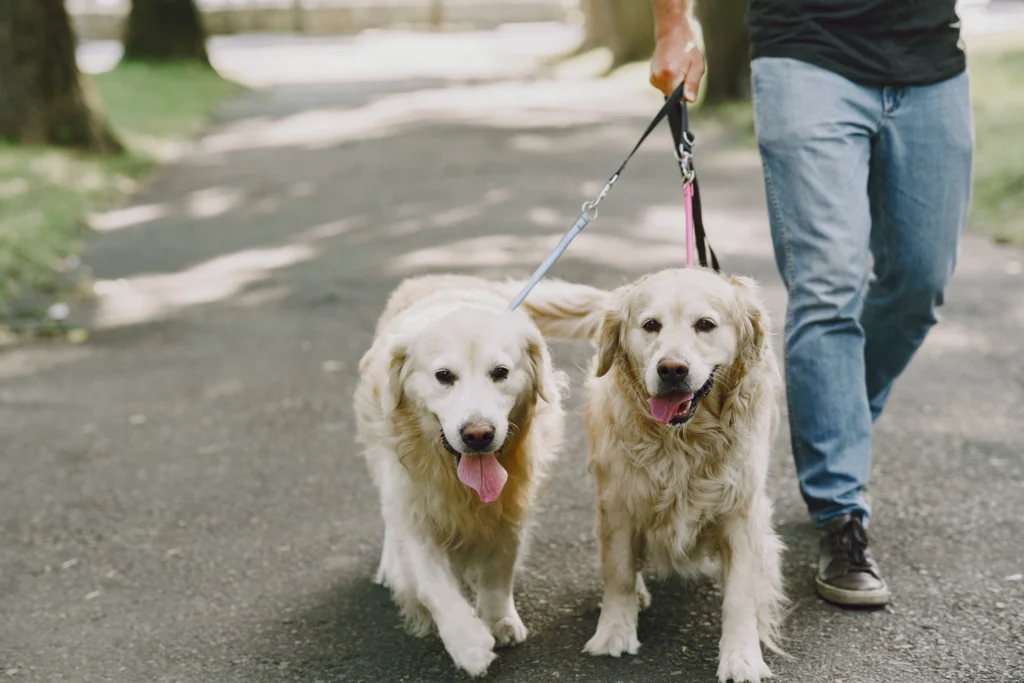
Statewide Dog Park and Recreation Laws
Unlike some states with blanket dog access laws in public spaces, Mississippi doesn’t have a single, unified regulation. The authority to determine dog access in parks, trails, and other recreational areas falls primarily to individual municipalities and private entities that manage these spaces.
The Importance of Local Ordinances
While there’s no single state law, local ordinances play a vital role in defining dog access and regulations in public recreation areas. These ordinances can vary significantly, so it’s essential to research the specific rules in your area. Here’s how to find relevant information:
- Municipal Website: Most city and county websites will have information on their local ordinances, including those related to dog access in public spaces (parks, trails, beaches, etc.).
- Contacting Local Authorities: Reach out to your local parks and recreation department or animal control department. They can provide details on specific regulations and any permits or restrictions that may apply.
Understanding Common Dog Park and Recreation Scenarios
Here’s a look at some common scenarios and how dog access might be regulated in Mississippi:
- Dog Parks: Access to dog parks can vary widely. Some parks may have designated off-leash areas for supervised canine socialization, while others may completely restrict dogs or require them to be leashed at all times.
- Trails: Similar to dog parks, leash laws and access for dogs on trails can be location-specific. Some trails may be dog-friendly with leash requirements, while others may be off-limits to canines entirely.
- Public Beaches: Mississippi beaches may have specific regulations regarding dog access. Some beaches may allow dogs during certain hours or require them to be leashed, while others may be completely dog-free.
- State Parks: Mississippi State Parks generally allow dogs, but leash laws and restrictions on specific areas may apply. Always check the park website or park office for current regulations.
Beyond Local Ordinances
While local ordinances are the primary framework for dog access in Mississippi, here are some additional considerations:
- Federal Lands: National Forests and other federal lands within Mississippi may have their own regulations regarding dog access. Consult the managing agency’s website for specific details.
- Private Property: Dog access to private businesses, like campgrounds or dog-friendly restaurants, is at the discretion of the owner. Always check for signage or ask permission before entering with your dog.
Responsible Dog Ownership
Even in dog-friendly areas, responsible pet ownership is crucial:
- Leash Laws: Always adhere to leash laws and leash your dog appropriately, maintaining control at all times.
- Clean Up After Your Dog: Carry waste bags and dispose of your dog’s waste properly, regardless of location.
- Respectful Behavior: Be mindful of others. If your dog shows signs of aggression or discomfort, remove them from the situation.
- Vaccination Records: Ensure your dog is up-to-date on vaccinations, especially if visiting public spaces where they may encounter other animals.
Advocating for Dog-Friendly Recreation
Mississippi dog owners who wish to see expanded access for their furry companions in parks and trails can explore these avenues:
- Research Dog-Friendly Businesses: Support businesses that welcome dogs, encouraging others to follow suit.
- Contact Local Officials: Express your desire for more dog-friendly public spaces to your city council members or park and recreation department.
- Support Dog-Friendly Organizations: Organizations advocating for dog access can be a valuable resource for information and action.
Mississippi State Park Regulations
While there’s no single set of dog park and recreation laws across Mississippi, here are some examples from Mississippi State Parks to illustrate the range of regulations:
- Tuxachanie National Wildlife Refuge: Dogs must be leashed at all times.
- Tombigbee State Park: Dogs are allowed, but must be leashed at all times and are not permitted on swimming beaches or nature trails.
- Clarkco State Park: Dogs are allowed in designated areas and must be leashed at all times.
Dog Food and Nutrition Laws in Mississippi
Mississippi’s diverse landscapes and welcoming atmosphere extend to furry companions as well. But when it comes to feeding your canine friend, navigating the legalities and best practices surrounding dog food and nutrition can be a confusing task. While Mississippi doesn’t have specific state laws directly regulating dog food, understanding the federal framework and responsible pet ownership are key.

State-Level Dog Food Laws
Unlike some states with regulations on pet food labeling or sales, Mississippi doesn’t have its own dog food laws. However, the federal government plays a crucial role in ensuring the safety and quality of pet food available in the state.
The Role of the FDA in Dog Food Regulation
The U.S. Food and Drug Administration (FDA) is the primary agency responsible for regulating pet food in the United States. The FDA sets guidelines for:
- Labeling: Pet food labels must be truthful and not misleading. They should clearly list ingredients, guaranteed analysis (nutrient content), and feeding instructions.
- Manufacturing Practices: The FDA sets Good Manufacturing Practices (GMPs) for pet food manufacturers to ensure consistent quality and safety.
- Recalls: The FDA works with pet food companies to initiate recalls if safety hazards are identified in certain products.
Mississippi Department of Agriculture and Commerce (MDAC)
While the FDA takes the lead on pet food regulation, the Mississippi Department of Agriculture and Commerce (MDAC) plays a supporting role:
- Feed and Fertilizer Laws: The MDAC enforces Mississippi’s Commercial Feed Law, which sets broad standards for the labeling and registration of commercial animal feed, including pet food. This law aligns with federal regulations established by the FDA.
- Consumer Protection: The MDAC investigates consumer complaints related to pet food and works with the FDA to address potential issues.
Choosing the Right Dog Food
There are no state-mandated requirements for dog food content or nutritional profiles in Mississippi. However, responsible pet ownership means choosing food that meets your dog’s specific needs:
- Consult Your Veterinarian: Discuss your dog’s age, breed, activity level, and any health concerns with your veterinarian. They can recommend a food that provides the right balance of nutrients for optimal health.
- Read the Label Carefully: Understand the ingredients and guaranteed analysis information on the dog food label. Look for high-quality protein sources, essential vitamins and minerals, and age-appropriate formulations.
- Beware of Marketing Claims: Don’t be swayed by marketing gimmicks. Focus on the actual ingredients and nutritional content listed on the label.
Considerations for Raw Diets and Homemade Food
While commercially manufactured dog food is the most common option, some pet owners choose to feed their dogs raw diets or homemade food. However, these approaches require extra vigilance:
- Nutritional Balance: Raw diets and homemade food need to be carefully formulated to ensure your dog receives all the essential nutrients they need. Consult with a veterinarian or a qualified animal nutritionist to create a balanced recipe.
- Food Safety Concerns: Raw meat carries a higher risk of bacterial contamination. Proper handling and hygiene are crucial when preparing raw food for your dog.
- Veterinarian Monitoring: If feeding your dog a raw diet or homemade food, regular veterinary checkups are essential to monitor their health and ensure they’re getting the proper nutrition.
Mississippi State University College of Veterinary Medicine
The Mississippi State University College of Veterinary Medicine (MSU CVM) can be a valuable resource for pet owners:
- Nutritional Guidance: The MSU CVM website may offer information on canine nutrition and choosing the right food for your dog.
- Veterinarian Consultation: The MSU CVM Teaching Hospital provides veterinary services, including consultations on pet nutrition and dietary needs.
Dog Health and Veterinary Care Laws in Mississippi
Mississippi’s charm extends far beyond its hospitality. Lush landscapes and vibrant communities make it an ideal place to live with your furry friend. But ensuring your dog’s health and well-being requires understanding the legalities and best practices surrounding veterinary care in the state. While Mississippi doesn’t have a single, comprehensive set of “dog health laws,” several key points come into play.

Statewide Dog Health Laws
There aren’t any overarching dog health laws in Mississippi. However, the state enforces regulations regarding veterinary practice and animal cruelty prevention, which indirectly impact your dog’s healthcare.
Ensuring Ethical Veterinary Practice
The Mississippi Board of Veterinary Medicine (MBVM) plays a crucial role in safeguarding animal health:
- Veterinarian Licensing: The MBVM licenses veterinarians in Mississippi. Only licensed veterinarians can legally diagnose and treat animals in the state.
- Practice Standards: The MBVM establishes and enforces standards of veterinary practice to ensure ethical and competent veterinary care.
- Disciplinary Actions: The MBVM investigates complaints against veterinarians and can take disciplinary actions in cases of misconduct or negligence.
Animal Cruelty Prevention
Mississippi has animal cruelty prevention laws outlined in Chapter 97 of the Mississippi Code Annotated (MCA). These laws define acts of cruelty and neglect against animals, including dogs. While these laws don’t explicitly mandate specific veterinary care, they indirectly promote responsible pet ownership and seeking veterinary attention for sick or injured animals.
Prioritizing Preventative Care for Your Dog
While there aren’t specific dog health laws in Mississippi, focusing on preventative care is crucial for your canine companion’s well-being:
- Regular Veterinary Checkups: Schedule regular checkups with your veterinarian, even if your dog seems healthy. These visits allow for early detection of potential health problems.
- Vaccinations: Vaccinations are essential for protecting your dog from preventable diseases. Follow your veterinarian’s recommendations for core vaccinations and any non-core vaccines based on your dog’s lifestyle and risk factors.
- Parasite Prevention: Implement a parasite prevention plan (e.g., heartworm medication, flea and tick control) recommended by your veterinarian.
- Spaying/Neutering: Spaying or neutering your dog not only helps control the pet population but also offers potential health benefits for your pet.
Understanding Rabies Vaccination Requirements
Mississippi has a specific law regarding rabies vaccinations for dogs:
- Rabies Vaccination Requirement: Mississippi law (MCA § 69-15-9) mandates rabies vaccinations for all dogs over four months old. Vaccination certificates must be provided by a licensed veterinarian.
Additional Considerations for Responsible Dog Ownership
Beyond preventative care and vaccinations, responsible dog ownership includes:
- Providing a Balanced Diet: Feed your dog a high-quality diet that meets their nutritional needs based on age, breed, and activity level.
- Exercise and Mental Stimulation: Regular exercise and mental stimulation are essential for your dog’s physical and mental well-being.
- Safe and Clean Environment: Provide your dog with a clean and safe living environment, including access to fresh water, a comfortable bed, and proper waste disposal.
Finding the Right Veterinarian in Mississippi
Choosing the right veterinarian for your dog is essential:
- Ask for Recommendations: Talk to friends, family, and other dog owners in your area for recommendations.
- Consider Location and Services: Choose a veterinarian with a convenient location and that offers the services you need for your dog.
- Schedule a Consultation: Schedule a consultation with a potential veterinarian to discuss your dog’s needs and ensure a good fit.
Mississippi State University College of Veterinary Medicine (MSU CVM)
The Mississippi State University College of Veterinary Medicine (MSU CVM) offers valuable resources for dog owners:
- Pet Owner Information: The MSU CVM website may have information on various dog health topics, vaccination schedules, and responsible pet ownership practices.
- Veterinary Services: The MSU CVM Teaching Hospital provides comprehensive veterinary services, including wellness exams, vaccinations, surgery, and specialty care.
Financial Considerations for Veterinary Care
Veterinary care can be expensive. Here are some tips for managing costs:
- Pet Insurance: Consider pet insurance to help offset the costs of unexpected veterinary bills.
- Budgeting: Factor in regular veterinary checkups and potential emergencies when creating your pet budget.
- Financial Assistance Programs: Some organizations may offer financial assistance programs for pet owners who struggle to afford veterinary care.
Dog Identification and Microchipping Laws in Mississippi
Mississippi’s rich culture and welcoming atmosphere extend to canine companions. But ensuring your dog’s safety and well-being involves proper identification. While Mississippi doesn’t have a mandatory microchipping law, understanding dog identification options and responsible pet ownership practices is crucial.

Mandatory Dog Microchipping Laws
Unlike some states with laws mandating microchipping for all dogs, Mississippi doesn’t have such a requirement. However, the state does encourage responsible pet identification through leash laws and licensing requirements.
The Importance of Dog Identification
Even the most responsible pet owners can experience the heartbreak of a lost dog. Proper identification increases the chances of a safe and quick reunion. Here’s why dog identification matters:
- Lost Dog Recovery: A collar with identification tags is the most basic form of dog identification. It allows anyone who finds your lost dog to easily contact you.
- Animal Control Interactions: If your dog gets picked up by animal control, a collar with ID tags allows them to verify ownership and return your pet quickly.
- Proof of Ownership: Identification can serve as proof of ownership in case of disputes or emergencies.
Common Dog Identification Methods in Mississippi
While microchipping isn’t mandatory, several dog identification methods are popular in Mississippi:
- Collar and ID Tags: A well-fitting collar with identification tags is essential. Tags should include your dog’s name, your phone number, and potentially rabies vaccination information.
- Engraved Tags: Consider engraved tags instead of printed ones for increased durability and clarity.
A Permanent Identification Solution
While not mandatory, microchipping offers a permanent and reliable method of dog identification:
- Microchip Implantation: A microchip is a tiny rice-sized device implanted under your dog’s skin between the shoulder blades. It contains a unique identification number that can be scanned by a veterinarian or animal shelter with a microchip reader.
- Reuniting Lost Dogs: If your microchipped dog gets lost and ends up at a shelter or veterinary clinic, a scan can reveal your contact information, facilitating a swift reunion.
Leash Laws and Licensing Incentives
While Mississippi doesn’t mandate microchipping, Chapter 19 of the Mississippi Code Annotated (MCA) indirectly encourages responsible pet ownership through:
- Leash Laws: Many Mississippi municipalities have leash laws requiring dogs to be leashed in public spaces. This helps prevent straying and reduces the risk of your dog getting lost.
- Licensing Incentives: Some Mississippi counties offer discounts on dog licenses for microchipped dogs. This can provide a financial incentive for responsible pet ownership.
Responsible Pet Ownership Practices
Responsible pet ownership extends beyond just identification:
- Keep Tags Updated: Ensure your dog’s ID tags are current with your contact information.
- Update Microchip Information: If you move or change phone numbers, update the information associated with your dog’s microchip.
- Annual License Renewal (if applicable): If your county requires dog licensing, renew your dog’s license annually.
Finding a Reputable Microchip Implantation Service
Microchipping your dog is a simple and safe procedure:
- Veterinarians: Most veterinarians offer microchipping services. They can implant the microchip, register the microchip with a national database, and provide you with registration information.
- Animal Shelters: Some animal shelters may offer microchipping services, particularly during adoption events.
Choosing a Microchip Brand and Registry
Several microchip brands and registries are available. Here are some factors to consider:
- Universal Compatibility: Choose a microchip brand compatible with universal scanners used by most shelters and veterinary clinics.
- Lifetime Registration: Opt for a microchip with lifetime registration to ensure your information remains accessible.
Dog Breeding and Genetics Laws in Mississippi
Mississippi, the birthplace of the American Kennel Club (AKC) co-founder, boasts a rich history of canine companionship. But for those considering entering the world of dog breeding, understanding the legalities surrounding dog breeding and genetics in Mississippi is crucial. While there isn’t a single, comprehensive set of regulations, several key points come into play.

Statewide Dog Breeding Laws
Mississippi doesn’t have overarching dog breeding laws. This means the regulations and requirements for breeding dogs can vary depending on factors like:
- Location: Municipalities may have local ordinances related to kennel operation or animal breeding within city limits.
- Breed Association Membership: Some dog breed associations have specific breeding standards and requirements for their members.
- Commercially Licensed Breeders: Larger commercial kennels with ten or more breeding females may require licensing from the Mississippi Department of Agriculture and Commerce (MDAC).
Common Dog Breeding Scenarios in Mississippi
Here’s a breakdown of how dog breeding regulations might differ based on specific scenarios:
- Hobby Breeders: Individuals breeding dogs occasionally (e.g., from a litter born to their pet) typically don’t require state licensing in Mississippi. However, local ordinances or breed association membership might have regulations.
- Commercial Breeders: Larger kennels with ten or more breeding females may need to be licensed by the MDAC. These licenses are subject to renewal and inspections.
Considerations for Responsible Dog Breeding
Even in the absence of comprehensive state laws, responsible dog breeding practices are essential in Mississippi:
- Health Testing: Reputable breeders perform health screenings on breeding stock to reduce the risk of passing on genetic diseases to puppies.
- Breed Standards: Following established breed standards ensures puppies conform to breed characteristics and temperament.
- Proper Care and Husbandry: Providing breeding dogs with proper nutrition, veterinary care, socialization, and clean living conditions is vital.
- Ethical Sales Practices: Reputable breeders screen potential buyers, provide accurate information about the puppies, and prioritize responsible pet placement.
Mississippi Department of Agriculture and Commerce (MDAC) Regulations (For Licensed Kennels)
While there’s no single set of dog breeding regulations in Mississippi, here’s an overview of what MDAC licensing for commercial kennels might entail:
- Facility Inspections: MDAC may conduct inspections to ensure the kennel meets minimum standards for animal housing, sanitation, and veterinary care.
- Recordkeeping: Licensed breeders may be required to maintain records of breeding activities, vaccinations, and health testing for their dogs.
- Animal Welfare Standards: The MDAC enforces basic animal welfare standards to ensure the well-being of breeding dogs.
The Role of Breed Associations in Dog Breeding
Breed associations play a significant role in dog breeding:
- Breed Standards: Breed associations establish breed standards outlining physical characteristics, temperament, and other breed-specific traits.
- Breeding Requirements: Some breed associations have specific requirements for members who want to breed their dogs. These may include health testing protocols, pedigree verification, and adherence to ethical breeding practices.
- Registration and Pedigrees: Breed associations offer dog registration and provide pedigree documentation for puppies bred according to their standards.
Dog Genetics and Potential Legal Issues
While Mississippi doesn’t have specific laws on dog genetics, understanding some basic principles can help avoid legal issues:
- Avoid Unethical Breeding Practices: Practices like breeding unhealthy dogs or purposefully breeding for extreme physical traits can raise ethical concerns and potentially legal issues related to animal cruelty.
- Truthful Representation of Puppies: Be transparent about any potential genetic health concerns in the breeding line and avoid misleading buyers about the puppies’ pedigree or characteristics.
Resources for Responsible Dog Breeders in Mississippi
Several resources can support responsible dog breeding practices in Mississippi:
- Mississippi Department of Agriculture and Commerce (MDAC): The MDAC website provides information on licensing requirements for commercial kennels.
- American Kennel Club (AKC): The AKC offers resources on responsible breeding practices, health testing recommendations, and breeder education programs.
- National Club for Your Dog Breed: Most dog breeds have a national club dedicated to the breed’s well-being. These clubs often have resources and guidance for breeders.
Dog Environmental Impact Laws in Mississippi
Mississippi’s diverse landscapes, from rolling hills to vibrant wetlands, offer endless opportunities for outdoor adventures with your furry friend. But ensuring a positive impact on the environment while enjoying these adventures requires understanding the link between dogs and the environment, as well as any relevant regulations in Mississippi. While there aren’t specific “dog environmental impact laws,” responsible pet ownership practices are key.

Dogs and the Environment
Dogs can have a positive or negative impact on the environment, depending on how we manage them. Here’s a look at some potential environmental concerns:
- Waste Management: Dog waste left behind can pollute waterways and harm wildlife if not disposed of properly.
- Habitat Disruption: Off-leash dogs can disturb wildlife habitats, chase birds and small animals, and disrupt delicate ecosystems.
- Erosion: Dog paws can contribute to soil erosion, especially on trails or in sensitive areas.
Minimizing Environmental Impact
By prioritizing responsible dog ownership, you can ensure your canine companion enjoys the outdoors while minimizing their environmental impact:
- Always Carry Waste Bags: Always carry waste bags on walks and hikes and dispose of dog waste properly in designated bins or by burying it deeply (away from water sources) in a biodegradable bag.
- Leash Laws and Responsible Leash Use: Follow leash laws in public spaces. Even in off-leash areas, maintain good voice control to prevent your dog from disturbing wildlife.
- Stay on Designated Trails: Stick to designated trails to minimize disruption to natural habitats.
- Respect “No Dogs Allowed” Areas: Be mindful of signage and respect areas where dogs are not permitted.
Considerations for Dog Owners
While no specific laws directly address dog environmental impact, some existing regulations in the Mississippi Code Annotated (MCA) can be relevant:
- Leash Laws (MCA Chapter 19): Many Mississippi municipalities have leash laws requiring dogs to be leashed in public spaces. This helps prevent them from disrupting wildlife or straying into sensitive areas.
- Littering Laws (MCA § 69-14-51): Leaving dog waste behind is considered littering. Disposing of waste properly is not only responsible pet ownership but also adheres to state littering laws.
Protecting the Environment
The Mississippi Department of Environmental Quality (MDEQ) plays a crucial role in safeguarding the state’s environment:
- Public Education: The MDEQ website may offer resources on responsible pet ownership and proper waste disposal practices.
- Water Quality Initiatives: The MDEQ works to protect water quality, which can be impacted by improper dog waste disposal.
Advocating for Dog-Friendly Environmental Practices
Dog owners can be advocates for dog-friendly environmental practices:
- Support Dog Parks and Recreation Areas: Promote the creation and maintenance of designated dog parks and recreation areas where dogs can exercise off-leash responsibly.
- Pick Up After Others: Lead by example and pick up after other dog owners who may leave waste behind.
- Spread Awareness: Educate other dog owners about the environmental impact of dogs and encourage responsible pet ownership practices.
Promoting Responsible Dog Ownership and Environmental Stewardship
Several organizations advocate for responsible dog ownership and environmental stewardship:
- Pick Up After Your Dog®: This national campaign promotes responsible waste disposal practices for dog owners.
- Leave No Trace: This organization promotes responsible outdoor recreation practices, which can be applied to dog-friendly hikes and outdoor adventures.
- Mississippi Sierra Club: This chapter of the Sierra Club advocates for environmental protection in Mississippi and may offer resources for dog owners who want to minimize their impact.
Dog Behavioural Training Laws in Mississippi
Mississippi’s charm extends far beyond its hospitality. Lush landscapes and vibrant communities make it an ideal place to live with your canine companion. But ensuring a well-behaved and happy dog requires proper training. While Mississippi doesn’t have specific laws mandating dog training, understanding the legal landscape and responsible ownership practices is key.

Mandatory Dog Training Laws
Unlike some states with laws requiring dog obedience training after a bite incident, Mississippi doesn’t have such a requirement. However, the state enforces animal cruelty prevention laws that indirectly encourage responsible dog ownership and training.
Animal Cruelty Prevention
Chapter 97 of the Mississippi Code Annotated (MCA) outlines animal cruelty prevention laws. These laws define acts of cruelty and neglect against animals, including dogs. While they don’t mandate specific training methods, they indirectly promote responsible pet ownership and addressing behavioral problems that could lead to harm.
Prioritizing Positive Reinforcement Training
Positive reinforcement training methods are widely recommended for dog training:
- Reward-Based Techniques: Positive reinforcement focuses on rewarding desired behaviors, making training enjoyable and effective for both dog and owner.
- Building a Strong Bond: Positive training methods help build trust and a strong bond between you and your dog.
- Addressing Behavioral Issues: Positive reinforcement can address common behavioral problems like barking, jumping, chewing, or leash pulling.
Finding a Qualified Dog Trainer in Mississippi
Choosing the right dog trainer is crucial for success:
- Ask for Recommendations: Talk to friends, family, and veterinarians for recommendations of qualified dog trainers in your area.
- Consider Training Methods and Philosophy: Choose a trainer who uses positive reinforcement methods that align with your values and training goals.
- Experience and Credentials: Look for trainers with experience working with dogs similar to yours and any relevant certifications.
Mississippi State University College of Veterinary Medicine (MSU CVM)
The Mississippi State University College of Veterinary Medicine (MSU CVM) offers valuable resources for dog owners:
- Dog Training Information: The MSU CVM website may offer information on positive reinforcement training methods, common behavioral issues, and choosing a qualified trainer.
- Veterinarian Consultation: Veterinarians can provide guidance on behavior problems that may have underlying medical causes and recommend qualified trainers.
Leash Laws and Responsible Leash Use
Leash laws play a role in responsible dog ownership and can indirectly impact training:
- Mississippi Leash Laws (MCA Chapter 19): Many Mississippi municipalities have leash laws requiring dogs to be leashed in public spaces. Leash training is essential for safe and responsible walks.
- Benefits of Leash Training: Leash training helps your dog learn impulse control, proper walking etiquette, and allows you to manage their behavior in public settings.
Responsible Dog Ownership and Addressing Behavioral Problems
Responsible dog ownership extends beyond training:
- Socialization: Socialize your dog from a young age to ensure they are comfortable interacting with other dogs and people.
- Exercise: Provide your dog with regular exercise to release pent-up energy and promote good behavior.
- Mental Stimulation: Engage your dog’s mind with mental stimulation activities like puzzle toys or training sessions to prevent boredom and destructive behaviors.
- Seek Professional Help: If you’re struggling with behavioral problems, don’t hesitate to seek help from a qualified dog trainer or animal behaviorist.
Organizations Promoting Positive Dog Training
Several organizations advocate for positive dog training methods:
- The Association of Professional Dog Trainers (APDT): The APDT provides resources on finding qualified trainers who use positive reinforcement methods.
- The American Society for the Prevention of Cruelty to Animals (ASPCA): The ASPCA offers information on positive dog training techniques and resources for dealing with behavioral problems.
Dog Protection and Rescue Laws in Mississippi
Mississippi’s rich heritage extends to its love for animals. Whether you’re a devoted dog owner or someone passionate about animal welfare, understanding dog protection and rescue laws in Mississippi is crucial. While there isn’t a single, comprehensive set of laws, several key points come into play.

Statewide Dog Protection Laws
Mississippi doesn’t have overarching dog protection laws. However, the state enforces animal cruelty prevention laws and regulations concerning animal shelters and rescue organizations, which indirectly contribute to dog protection and rescue efforts.
Animal Cruelty Prevention
Chapter 97 of the Mississippi Code Annotated (MCA) outlines animal cruelty prevention laws. These define acts of cruelty and neglect against animals, including dogs. This legal framework helps protect dogs from intentional harm and neglect, laying the groundwork for rescue efforts when such acts occur.
The Role of Animal Shelters and Rescue Organizations in Dog Protection
Animal shelters and rescue organizations play a critical role in dog protection and rescue in Mississippi:
- Impounding Stray Dogs: Animal control officers impound stray dogs. Shelters and rescues work to find these dogs permanent homes or reunite them with their owners.
- Providing Care for Abandoned Dogs: Shelters and rescues care for abandoned dogs, offering them food, shelter, veterinary care, and socialization until they find new homes.
- Investigating Animal Cruelty Cases: Some shelters and rescue organizations may assist law enforcement in investigating animal cruelty cases involving dogs.
Regulations for Animal Shelters
The Mississippi Department of Agriculture and Commerce (MDAC) oversees regulations for animal shelters:
- Licensing Requirements: Shelters may require licensing from the MDAC.
- Minimum Standards of Care: Shelters must adhere to minimum standards of care for animals, including proper housing, sanitation, and veterinary care.
- Inspections: The MDAC may conduct inspections to ensure shelters comply with regulations.
Regulations for Animal Control
The Mississippi Department of Health (MSDH) establishes regulations for animal control:
- Holding Periods: Animal control may hold stray dogs for a certain period to allow owners to reclaim them.
- Euthanasia Protocols: The MSDH outlines guidelines for animal control agencies regarding euthanasia procedures, often used as a last resort after holding periods and adoption efforts are exhausted.
Mississippi Charitable Solicitations Act
The Mississippi Charitable Solicitations Act regulates fundraising activities of charitable organizations, including those involved in animal rescue. Understanding these regulations ensures responsible donation practices when supporting dog rescue organizations in Mississippi.
Responsible Ownership and Supporting Rescue Efforts
Beyond legalities, responsible ownership practices contribute to dog protection:
- Microchip Your Dog: Microchipping your dog increases the chances of a safe reunion if they get lost.
- Spay/Neuter Your Dog: Spaying or neutering your dog helps control the pet population and reduce the number of dogs ending up in shelters.
- Adopt, Don’t Shop: Consider adopting a dog from a shelter or rescue organization instead of buying from a breeder.
Dog Rescue Organizations in Mississippi
Several dog rescue organizations work tirelessly to help homeless dogs in Mississippi:
- Mississippi Animal Rescue League (MARL): A statewide non-profit organization dedicated to rescuing, sheltering, and adopting homeless dogs.
- Local Shelters and Rescue Groups: Many local shelters and rescue groups in Mississippi work to find homes for homeless dogs in their communities.
Dog Entertainment and Work Laws in Mississippi
Mississippi’s vibrant culture extends to its love for dogs. From loyal hunting companions to playful family members, canines play diverse roles in Mississippian life. But navigating the legalities surrounding dog entertainment and work activities requires understanding the legal landscape. While Mississippi doesn’t have a comprehensive set of laws specific to dog work or entertainment, several key points come into play.

Dog Work and Entertainment Laws
Unlike some states with regulations for working dogs or animal actors, Mississippi doesn’t have specific laws governing these areas. However, existing regulations for animal cruelty prevention and general animal welfare provide an indirect framework.
Animal Cruelty Prevention
Chapter 97 of the Mississippi Code Annotated (MCA) defines acts of cruelty and neglect against animals, including dogs. This legal framework helps ensure dogs used for work or entertainment are treated humanely and receive proper care.
Dog Work Activities in Mississippi
While there aren’t specific work dog laws, several regulations might apply depending on the type of work a dog performs:
- Hunting Dogs: Mississippi has hunting regulations that may indirectly impact hunting dogs. These regulations might address licensing requirements, training practices, and permissible hunting seasons for specific wildlife.
- Livestock Guardian Dogs: Livestock guardian dogs used to protect farms or ranches may fall under general animal welfare regulations outlined in the Mississippi Code.
- Service Animals: The Americans with Disabilities Act (ADA) protects the rights of individuals with disabilities to use service animals in public spaces. Mississippi businesses and institutions must comply with the ADA.
Prioritizing Ethical Treatment for Working Dogs
Regardless of the work a dog performs, ethical treatment is crucial:
- Proper Training: Working dogs require specialized training to perform their duties safely and effectively.
- Adequate Rest and Recovery: Working dogs need sufficient rest periods and recovery time to avoid exhaustion or injury.
- Veterinary Care: Regular veterinary care is essential to ensure working dogs remain healthy and fit for their tasks.
Considerations for Working Animals
While there aren’t specific work dog regulations, the MDAC plays a role in animal welfare:
- Livestock Regulations: The MDAC may have regulations related to the treatment and welfare of livestock, which could indirectly impact the well-being of working dogs used in livestock management.
- Animal Cruelty Investigations: The MDAC may investigate cases of animal cruelty involving working dogs.
Exploring Dog Entertainment Activities in Mississippi
Mississippi doesn’t have specific laws for dog entertainment activities, but existing regulations might be relevant depending on the context:
- Dog Shows: Some dog show organizations have their own regulations regarding dog health, breed standards, and ethical treatment during shows.
- Animal Performance Regulations: Mississippi may have regulations governing animal performances or exhibitions, which could indirectly apply to dog entertainment activities.
Prioritizing Animal Welfare in Dog Entertainment
Even in the absence of specific laws, prioritizing animal welfare is essential in dog entertainment:
- Breeds Suitable for Performance: Choose dog breeds well-suited for the type of entertainment activity to prevent physical strain or discomfort.
- Positive Reinforcement Training: Use positive reinforcement training methods to ensure the dog enjoys participating in the activity.
- Adequate Rest and Breaks: Provide dogs with sufficient rest breaks and avoid overexertion during entertainment activities.
Promoting Ethical Treatment of Animals in Entertainment
Several organizations advocate for ethical treatment of animals in entertainment:
- The American Humane Society: This organization works to safeguard animals used in entertainment and provides resources for responsible animal handling practices.
- The ASPCA (American Society for the Prevention of Cruelty to Animals): The ASPCA advocates for animal welfare and offers guidelines for ethical animal treatment in various settings.
Dog Technology and Innovation Laws in Mississippi
Mississippi, the birthplace of the American Kennel Club co-founder, fosters a strong bond between humans and canines. Technology is rapidly transforming how we care for our dogs, but navigating the legal landscape surrounding pet tech products and innovations in dog health technology in Mississippi requires some exploration. While there aren’t currently specific laws directly regulating dog tech, understanding existing regulations and responsible pet ownership practices is key.
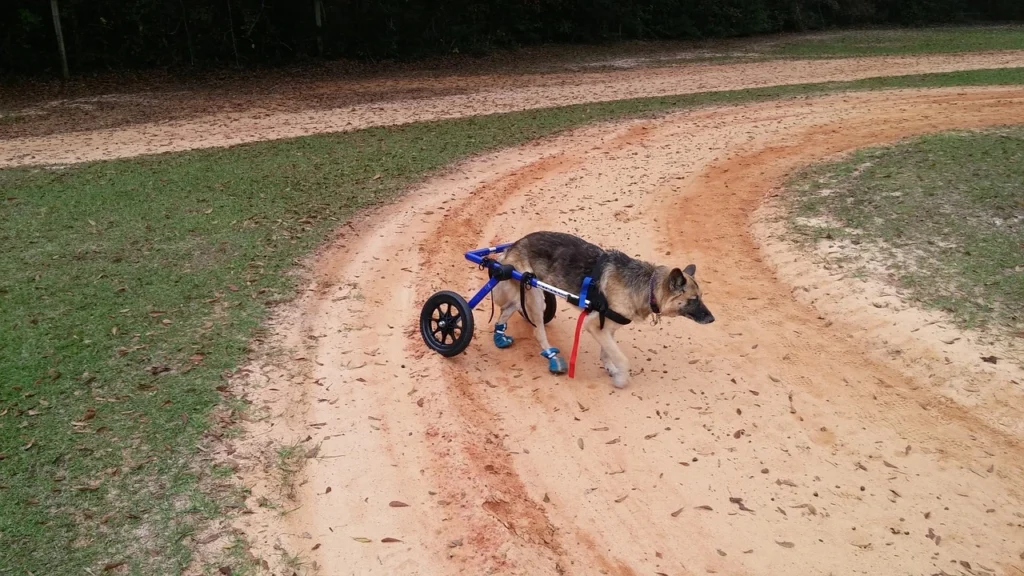
Dog Technology Laws
Mississippi doesn’t have a set of laws specifically governing pet tech or dog health technology innovations. However, existing regulations related to animal welfare, veterinary medicine, and consumer protection provide an indirect framework.
Animal Cruelty Prevention
Chapter 97 of the Mississippi Code Annotated (MCA) outlines animal cruelty prevention laws. This legal framework ensures any pet tech product or innovation doesn’t inflict pain, suffering, or neglect on dogs.
Safeguarding Animal Care
The Mississippi Board of Veterinary Medical Examiners (MBVME) plays a crucial role in safeguarding animal care:
- Veterinarian Licensing: The MBVME licenses veterinarians in Mississippi, ensuring they meet qualifications and adhere to ethical treatment standards.
- Veterinary Oversight of Dog Health Technology: The MBVME might require certain dog health technologies to have veterinary oversight or approval, especially those involving medical diagnosis or treatment.
Protecting Consumers
The Mississippi Department of Consumer Protection (MDCP) protects consumers from fraudulent or unsafe products:
- Consumer Protection Laws: The MDCP enforces consumer protection laws that may apply to pet tech products. These laws may address product safety, misleading advertising, and warranty practices.
- Investigating Consumer Complaints: The MDCP investigates consumer complaints related to pet tech products and takes action against companies violating consumer protection laws.
Common Types of Dog Technology
The world of dog tech is constantly evolving, but here are some common categories:
- Wearable Tracking Devices: These devices attach to a dog’s collar and track location, activity levels, and even vital signs.
- Remote Training Devices: These tools use electronic stimulation, sounds, or vibrations to train dogs remotely.
- Automated Feeders and Water Dispensers: These devices provide automated food and water distribution for dogs.
- Smart Toys and Interactive Games: These tech-enabled toys stimulate a dog’s mind and encourage play.
Considering Responsible Use of Dog Technology
While dog tech offers exciting possibilities, responsible use is crucial:
- Veterinarian Consultation: Consult your veterinarian before using any dog health technology, especially those impacting your dog’s health or well-being.
- Prioritize Animal Welfare: Choose dog tech that prioritizes your dog’s comfort and safety. Avoid products that rely on harsh methods or cause pain.
- Maintain Human-Dog Bond: Technology shouldn’t replace traditional human-dog interaction like walks, playtime, and training.
The Future of Dog Technology and Innovation
The future of dog technology holds immense potential for improving canine health and well-being. Here are some areas to watch:
- Telehealth for Pets: Remote veterinary consultations could offer greater accessibility to veterinary care.
- Advanced Diagnostics and Monitoring: Tech advancements could enable early detection and management of health issues in dogs.
- Personalized Care Solutions: Technologies could tailor care plans based on a dog’s unique needs and breed.
Organizations Shaping the Future of Pet Tech
Several organizations are shaping the future of pet tech responsibly:
- The Association for Pet Product Manufacturers (APPMA): This organization promotes responsible practices and product safety within the pet industry.
- The American Animal Hospital Association (AAHA): The AAHA provides resources and guidance on the ethical use of technology in veterinary medicine.
Human Coexistence Laws in Mississippi
Mississippi’s rich heritage is interwoven with a love for dogs. From hunting partners to cherished family members, canine companions play a vital role in our lives. But fostering a harmonious human-dog co-existence requires understanding the legal landscape in Mississippi. While there aren’t specific “cohabitation laws,” several regulations and responsible ownership practices promote a happy and safe life together.

Cohabitation Laws
Mississippi doesn’t have a single set of laws directly promoting dog-human cohabitation. However, existing legislation and regulations regarding animal welfare, public safety, and responsible pet ownership indirectly contribute to a positive co-existing environment.
Animal Cruelty Prevention
Chapter 97 of the Mississippi Code Annotated (MCA) establishes animal cruelty prevention laws. This legal framework ensures dogs are treated humanely and receive proper care, fostering a foundation for a positive human-dog bond.
Public Health and Responsible Pet Ownership
The Mississippi Department of Health (MSDH) plays a key role in promoting public health and responsible pet ownership:
- Vaccinations: The MSDH enforces vaccination requirements for dogs to prevent the spread of rabies and other diseases, protecting both human and canine health.
- Licenses and Tags: Dog licensing and tag requirements help with animal control and identification, promoting responsible ownership and public safety.
- Spaying/Neutering: The MSDH may advocate for spaying and neutering programs to control the pet population, ultimately reducing the number of stray dogs and promoting responsible pet ownership.
Leash Laws and Responsible Leash Use
Leash laws play a crucial role in promoting safe co-existence in public spaces:
- Understanding Leash Laws (MCA Chapter 19): Many Mississippi municipalities have leash laws requiring dogs to be leashed in public spaces. Leash use ensures your dog’s safety and prevents disruptions to others.
- Benefits of Leash Training: Leash training helps your dog learn impulse control and proper walking etiquette, allowing them to safely socialize with other dogs and people during walks.
Fostering a Strong Human-Dog Bond
Building a strong human-dog bond goes beyond legal requirements:
- Positive Reinforcement Training: Positive reinforcement training methods promote a joyful and trusting relationship between you and your dog.
- Socialization: Socialize your dog from a young age to ensure they are comfortable interacting with other dogs and people. This creates a well-rounded and adaptable canine companion.
- Exercise and Mental Stimulation: Regular exercise and mental stimulation activities like playing fetch, training sessions, or puzzle toys promote physical and mental well-being for your dog, strengthening your bond.
Resources for Dog Owners
The Mississippi State University College of Veterinary Medicine (MSU CVM) offers valuable resources for dog owners:
- Behavior and Training Information: The MSU CVM website may offer information on positive reinforcement training techniques and resources for fostering a strong human-dog bond.
- Veterinarian Consultation: Veterinarians can provide guidance on behavior problems, training methods, and overall dog care, promoting a healthy and happy relationship between you and your canine companion.
Mississippi’s Dog-Friendly Establishments
Mississippi boasts an increasing number of dog-friendly establishments:
- Restaurants with Outdoor Patios: Many restaurants allow well-behaved dogs on their outdoor patios, creating opportunities for social outings with your furry friend.
- Dog Parks and Recreation Areas: Designated dog parks provide safe spaces for your dog to run, play, and socialize with other dogs, promoting positive interactions and strengthening your bond.
- Dog-Friendly Stores and Businesses: Some businesses welcome well-behaved dogs, allowing you to include your canine companion in more aspects of your life.
Organizations Promoting Human-Dog Coexistence
Several organizations advocate for the positive impact of human-dog relationships:
- The Human Animal Bond Research Institute (HABRI): This organization conducts research on the benefits of human-animal interactions and promotes responsible pet ownership practices.
- The American Society for the Prevention of Cruelty to Animals (ASPCA): The ASPCA advocates for animal welfare and provides resources on building strong bonds with your dog.
Other Relevant Dog Laws in Mississippi
Canine Good Citizen (CGC) Programs and Legal Benefits in Mississippi
- Canine Good Citizen Programs: Mississippi dog owners can participate in CGC programs offered by organizations like the American Kennel Club (AKC). These programs train dogs in basic obedience and social skills.
- Potential Benefits: CGC certification might not have direct legal benefits in Mississippi, but it demonstrates responsible ownership and well-trained dogs. Some dog parks or rental properties might favor CGC-certified dogs.
Dog Insurance and Coverage Laws in Mississippi
- Dog Insurance: Mississippi doesn’t mandate dog insurance, but it’s a wise investment. Dog insurance helps cover veterinary expenses for accidents, illnesses, and even surgeries.
- Coverage Options: Dog insurance policies vary. Consider factors like breed, age, and pre-existing conditions when choosing coverage.
Laws Regarding Dogs in Hot Cars and Animal Endangerment in Mississippi
- Animal Cruelty Prevention (MCA Chapter 97): Leaving a dog in a hot car can be considered animal cruelty under Mississippi law. This law protects animals from intentional harm or neglect.
- Responding to Hot Car Situations: If you see a dog in a hot car, Mississippi law allows you to take reasonable steps to remove the animal from immediate danger, like contacting animal control.
Legal Aspects of Dog Parks and Shared Spaces in Mississippi
- Leash Laws and Park Regulations: Many Mississippi municipalities have leash laws and specific regulations for dog parks. Always follow leash laws and park rules to ensure the safety and enjoyment of all users.
- Dog Park Liability: Mississippi dog park liability laws might vary. Be aware that some dog park operators may require disclaimers acknowledging owner responsibility for their dog’s behavior.
Dog-Related Property Damage and Homeowner’s Insurance in Mississippi
- Dog Bite Laws (Common Law): Mississippi follows common law for dog bites. This means dog owners are generally liable for injuries caused by their dog.
- Homeowner’s Insurance: Homeowner’s insurance policies might cover dog bite liability to a certain extent. Review your policy details and consider additional liability coverage if needed.
Service and Working Dog Laws in Employment and Public Access in Mississippi
- Americans with Disabilities Act (ADA): The ADA protects the rights of individuals with disabilities to use service animals in public spaces and workplaces. Mississippi businesses and institutions must comply with the ADA.
- State and Local Laws: Mississippi might have additional laws regarding working dogs used in specific professions (e.g., law enforcement).
Animal Welfare and Protection Laws Against Neglect and Abandonment in Mississippi
- Mississippi Code Annotated (MCA) Chapter 97: This chapter outlines animal cruelty prevention laws, including those against neglect and abandonment. These laws ensure dogs receive proper food, water, shelter, and veterinary care.
- Reporting Animal Neglect: If you suspect animal neglect or abandonment, report it to animal control or your local law enforcement agency.
Mississippi may not have a single canine code, but a network of laws and responsible ownership practices fosters a dog-friendly environment. Understanding animal cruelty prevention, leash laws, and regulations for working and service dogs is crucial. Responsible pet ownership, including training, socialization, and microchipping, strengthens the human-animal bond and ensures public safety. By complying with dog laws, Mississippi pet owners contribute to a happy and healthy coexistence for both dogs and humans.
FAQs
Can I bring my dog to the beach in Mississippi?
Mississippi beach regulations vary depending on the specific beach. Some beaches might allow leashed dogs during certain times, while others may have restrictions. It’s always best to check with the beach authority or park website before visiting with your furry friend.
What are the vaccination requirements for dogs in Mississippi?
Mississippi requires dogs to be vaccinated against rabies by a licensed veterinarian. Pups must be vaccinated at 3 months old and receive booster shots every 1-3 years depending on the vaccine type. Additional vaccinations for other diseases may be recommended by your veterinarian.
Are there any breed-specific laws in Mississippi?
Mississippi doesn’t have any statewide breed-specific bans or restrictions. However, some municipalities might have local ordinances targeting specific breeds considered potentially dangerous. Always check with your local animal control department for any breed-related regulations in your area.
What should I do if I lose my dog in Mississippi?
If your dog goes missing, act quickly:
1. Contact local animal shelters and animal control to report your missing dog.
2. File a lost pet report with your local law enforcement agency.
3. Post flyers and utilize online resources like social media and pet lost and found websites to spread the word.
4. Consider microchipping your dog. Microchips offer a permanent form of identification that can significantly increase the chances of a safe return if your dog gets lost.
Can I travel to Mississippi with my dog?
Mississippi doesn’t have specific restrictions on bringing dogs into the state. However, it’s always a good idea to check for any health certificate or vaccination requirements for traveling with your dog. Additionally, research dog-friendly accommodations and public spaces if you’re planning a trip to Mississippi with your canine companion.

